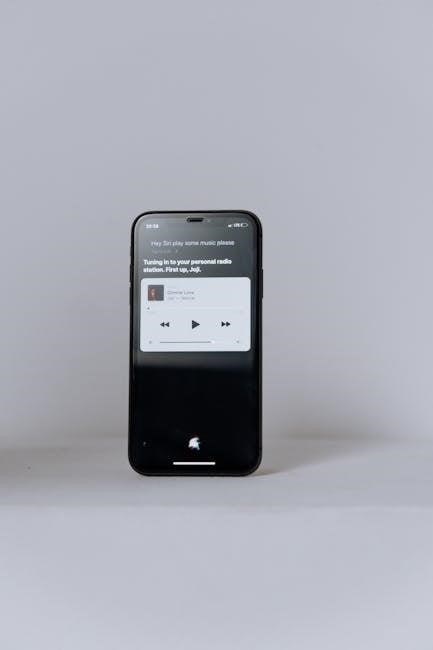Walt Whitman’s Song of Myself, part of Leaves of Grass, explores themes of individuality, unity, and the celebration of the human experience through innovative free verse poetry.
Overview of the Poem
Song of Myself is a masterpiece of American literature, exploring themes of identity, nature, and democracy. Written in free verse, it celebrates the individual and the universal, emphasizing unity and interconnectedness. Whitman’s innovative style rejects traditional rhyme and structure, creating a fluid, personal narrative. The poem is both deeply introspective and expansive, reflecting on life, love, and the human condition. Its accessible language and inclusive vision have made it a cornerstone of modern poetry, resonating with readers for generations. Whitman’s celebration of the self and the world remains timeless and profound. The poem is widely available as a free PDF.
Historical Context and Publication
First published in 1855, Song of Myself was part of Walt Whitman’s groundbreaking collection Leaves of Grass. Whitman self-published the first edition, which was revolutionary for its free verse style and celebration of democracy. The poem reflected the cultural and political tensions of pre-Civil War America, emphasizing unity and individuality. Over time, Whitman revised and expanded Leaves of Grass, with the final “Deathbed Edition” published in 1892. The poem’s innovative style and themes of interconnectedness resonated widely, making it a cornerstone of American literature. Today, Song of Myself is widely available as a free PDF.
Themes and Ideas in “Song of Myself”
Whitman explores individuality, universal identity, and the interconnectedness of all things, celebrating democracy, the human body, and the soul’s essence in his poetic masterpiece.
Individuality and Universal Identity
Walt Whitman’s Song of Myself champions individuality while embracing universal identity, celebrating the self as a microcosm of humanity. The poem asserts that every person’s experiences, thoughts, and existence are inherently valuable and interconnected, reflecting the democratic spirit of equality. Whitman’s poetry bridges the personal and the cosmic, emphasizing that individual uniqueness is part of a larger whole. Through free verse, he conveys the fluidity of identity, suggesting that personal and collective identities are intertwined. This theme is central to his vision of a unified, diverse world, where individuality thrives within the shared human experience.
Unity and Interconnectedness of All Things
In Song of Myself, Walt Whitman emphasizes the unity and interconnectedness of all existence, envisioning the world as a harmonious whole. He portrays nature, humanity, and the cosmos as intertwined, celebrating the oneness of life. Through vivid imagery, Whitman illustrates how every element, from the earth to the stars, is linked, fostering a sense of shared identity and belonging. This theme reflects his belief in the divine presence within all things, encouraging readers to embrace the beauty of interconnectedness and the unity that binds the universe together in a celestial dance of life and energy.
Celebration of the Human Body and Soul
Walt Whitman’s Song of Myself glorifies the human body and soul, viewing them as sacred and interconnected aspects of existence. He exalts physical sensations, desires, and the natural processes of life, rejecting societal taboos. Whitman’s poetry embraces the flesh as a manifestation of the divine, asserting that the body and soul are equal in their magnificence. This celebration of human wholeness reflects his belief in the intrinsic goodness of life, urging readers to accept and cherish their bodies as integral to their spiritual being, fostering a holistic understanding of self and the world.

Structure and Style of the Poem
Song of Myself is written in free verse, with no traditional rhyme or meter. Whitman’s innovative style features long, flowing lines and a conversational tone, creating a natural rhythm that mirrors the spontaneity of life and thought, reflecting his celebration of democracy and individuality.

Free Verse and Innovative Poetry
Walt Whitman’s Song of Myself revolutionized poetry by abandoning traditional forms. His use of free verse allowed for a fluid, natural expression, mirroring life’s spontaneity. Without rhyme or meter, Whitman’s poetry embraced a conversational tone, creating intimacy with readers. This style emphasized individuality and democratic ideals, breaking poetic conventions and paving the way for modern poetry. Whitman’s innovative approach celebrated the human experience and nature, making his work timeless and universally relatable. His bold departure from traditional structures remains a cornerstone of poetic innovation, inspiring future generations of poets to explore new forms and expressions.
Use of Nature Imagery
Walt Whitman’s Song of Myself is rich with nature imagery, symbolizing the unity of the individual and the cosmos. The “spear of summer grass” and “perfume of houses and shelves” evoke sensory experiences, connecting the self to the natural world. Whitman’s imagery reflects his belief in the interconnectedness of all things, celebrating the beauty and diversity of life. Through these vivid depictions, he invites readers to embrace the harmony between humanity and nature, emphasizing the divine in the everyday. This imagery not only enriches the poem but also underscores Whitman’s vision of a unified, thriving universe.
Key Passages and Their Significance
The opening lines of Song of Myself establish its central themes: “I celebrate myself, and sing myself.” These words introduce individuality and universal unity, setting the tone for Whitman’s exploration of identity and interconnectedness.
The Opening Lines and Their Impact
The opening lines of Song of Myself, “I celebrate myself, and sing myself,” profoundly establish the poem’s themes of self-love and universal connection. These lines introduce Whitman’s celebration of individuality while emphasizing the shared humanity that binds all people. The imagery of observing “a spear of summer grass” reflects his deep connection to nature and life. The lines also showcase Whitman’s innovative free verse style, breaking from traditional poetry forms. Their impact lies in their bold declaration of identity and their invitation to readers to embrace their own selves, creating a sense of unity and shared experience.
Whitman’s Celebration of Democracy
Walt Whitman’s Song of Myself is a powerful ode to democracy, celebrating the diversity and equality of all people. Whitman envisions democracy as a force that unites individuals, transcending social and economic divides. He portrays the democratic spirit through vivid imagery, emphasizing the inherent value of every person. His poetry not only reflects the ideals of American democracy but also expands them, advocating for inclusivity and freedom. This celebration is central to his work, making him a champion of democratic values and a voice for the universal human spirit.

Reception and Legacy
Song of Myself faced initial controversy due to its radical style and themes but later became a cornerstone of American literature, influencing modern poetry and celebrating democratic ideals.
Initial Controversy and Later Recognition
Upon its release, Song of Myself sparked controversy due to its unconventional style and explicit themes, which challenged traditional poetry norms. Critics deemed it immoral for its sensuality and celebration of the human body. However, over time, the poem gained recognition for its innovative free verse and groundbreaking themes of democracy and unity. Whitman’s bold exploration of identity and nature resonated deeply, solidifying his reputation as a visionary poet. Today, it is celebrated as a landmark of American literature, influencing generations of writers and thinkers with its profound and enduring message. Its legacy continues to grow, ensuring its timeless relevance.
Influence on Modern Poetry
Song of Myself revolutionized poetry by introducing free verse, breaking away from traditional rhyme and meter. Whitman’s innovative style inspired poets to explore new forms and themes, emphasizing individuality and nature. His celebration of democracy and the human spirit influenced modernists like Ezra Pound and Allen Ginsberg. The poem’s emphasis on personal and collective identity continues to resonate, making it a foundational text for contemporary poetry. Whitman’s legacy endures as a pioneer, shaping the direction of poetry and encouraging poets to embrace authenticity and experimentation in their work, ensuring his impact remains profound and lasting.

PDF Availability and Access
Song of Myself is freely available as a PDF, alongside text files, for easy access and reading. Download from various online repositories like WaltWhitman.com and academic archives.
Free Downloads and Online Resources
Walt Whitman’s Song of Myself is widely available for free download in PDF and other formats. Websites like WaltWhitman.com, Google Books, and Project Gutenberg offer easy access. Users can download the poem as a PDF, TXT, or EPUB file, ensuring compatibility with various devices. Additionally, platforms like the Internet Archive provide downloadable versions, including scanned copies of original editions. These resources make Whitman’s masterpiece accessible to readers worldwide, allowing everyone to explore his celebrated exploration of identity and humanity. Free downloads ensure that this literary treasure remains open to all, fostering a deeper appreciation for Whitman’s work.
